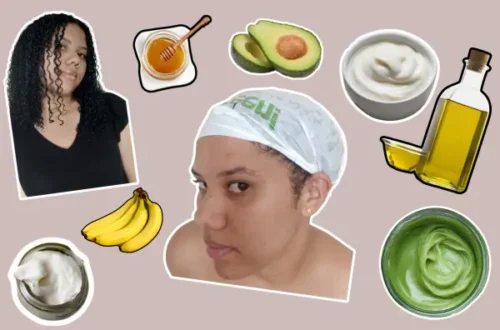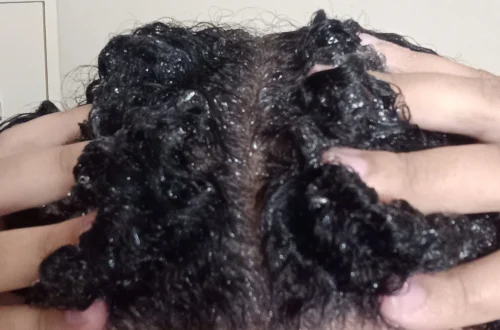Rice Water Rinse Recipe & Routine For Natural Curly Hair

When discussing natural hair treatments that work wonders for your curly hair, you need to look no further than rice water treatment.
This starchy liquid is packed full of amino acids and nutrients that will nourish and strengthen the hair, leaving you with shiny curls, and healthy curls, while also eliminating dry hair and frizzy hair.
Curly hair can be a challenge to manage, from dry hair to breakage, but this rice water method provides a solution to these issues.
If you want to know why to use rice water hair treatment for curly hair, read on for the benefits of this amazing treatment, plus the easiest rice water recipe to help you strengthen your hair, preventing hair breakage and leading to floor-length hair.
- Tips On How To Grow Your Low Porosity Natural Hair Fast
- An Easy Guide For A Natural Hair Wash Day Routine
- The Best Pre-Poo For Low Porosity Natural Hair
What Is The Rice Water Treatment?
Rice water is just what it sounds like, the water from rice, the left-over water from rice that is. When cooking rice, there is this starchy liquid that remains when you rinse the rice, that is leftover rice water. This cloudy water is rich in amino acids, vitamins, and starch and has a high protein content.
Rice in itself, whether that be white rice, black rice, red rice, or brown rice is packed with essential amino acids and nutrients.
When soaking rice (or fermenting and cooking), all that transfers into the water, which is why you end up with cloudy water.
Then, when you use this water as a strengthening rinse, you transfer all those essential vitamins to your hair strands, and you give it a protein boost!
Studies show that rice water contains inositol which is great for strengthening your curly hair.
The linoleic and ferulic acid in rice bran also provide hair benefits. These essential proteins and nutrients work together to make the hair stronger, restore damaged hair, and improve hair elasticity.
- Castor Vs Jojoba Oil, Which Is Best For Natural Hair Growth
- Moisturizing Vs Sealing Oils, What’s Best For Natural Hair
- 11 Top Hair Oils For Type 4 Hair (High & Low Porosity)
Benefits Of A Rice Water Rinse
The benefits of rice water rinses for curly hair are almost endless. There are many benefits of rice water rinse for curly hair, positive effects include:
- Contains amino acids, B vitamins, vitamin E, minerals and antioxidants that improve the health of your hair
- It strengthens your curls and adds thickness
- It gives your curls a healthy shine
- It helps increase the elasticity of your hair and adds bounce to your curls
- Detangles the hair
- Makes hair smoother
- Makes hair stronger
- Helps retain length, making it appear that the hair grows long and thicker
- It smoothes out your cuticles making your curls soft
- It provides relief from an itchy scalp and reduces dandruff
- It stimulates hair follicles and promotes hair growth
- It promotes better blood circulation in the scalp and fortifies the hair follicles
- It reduces product build-up
- It reduces hair shedding
- It conditions the hair
- Improves curl definition
- Adds volume
- It is high in antioxidants, thus repairing and moisturizing your hair and scalp
- It plays a vital role in taming your dry and frizzy hair
- It gently cleanses your curls
- It reduces surface friction in hair, preventing hair fall
- Makes curls smoother and reduces frizz
- Can help treat sun damage
- Do You Need To Oil Your Scalp? How To Harness The Full Power Of Oiling Your Scalp!
- Should You Be Using Eco Gel For Styling Your Natural Hair?
How To Make Your Own Rice Water Rinse:
Step 1 Of Rice Water Recipe: Choose Your Rice
You can use any type of rice: White rice, brown rice, black rice, red rice, etc.
White rice, the more commonly used rice, doesn’t have as much protein as other types of rice and provides smoother hair.
Red rice contains selenium to treat hair fall, which helps to prevent PCOS.
Black rice contains excellent antioxidants to strengthen hair and help with growth.
So, depending on your hair needs, choose the type of rice that best suits you, or whichever one you have handy.
Rinse the rice to wash out dirt and impurities with water. At this stage, simply drain the water without letting the rice soak in the water for a long time to avoid the loss of nutrients.
Step 2 Of Rice Water Recipe: Make The Rice Water
When making your rice water you have 3 options to choose from, soaking, fermenting, or boiling. They all yield different results and varying levels of protein and nutrients.
Soaking rice has less protein, while boiling rice may give you more of a protein boost. You do run the risk of boiling out all the nutrients if you boil the rice though.
Fermenting rice is my favorite option, while smelly, the fermentation process is the best for a potent protein treatment.
Soaking Rice:
- Take ½ cup of rice, uncooked and rinsed
- Place the rice in a bowl and add 2–3 cups of water
- Soak the rice for 30 minutes until you have cloudy water
- Strain the excess water into a clean bowl
Cooking Rice:
- Rinse ½ cup of rice
- Place in a pot with 2-3 cups of water
- Cook for about 15mins or until you see cloudy white water
- Press the rice as it boils, to extract all the nutrients from it
- Strain the excess water into a clean bowl
Fermented Rice Water:
- Rinse 1 cup of rice
- Add 2 cups of water
- Leave the mixture to sit at room temperature for 1-2 days until the fermentation process begins
- Strain the fermented rice water into a clean bowl
How To Use Your Rice Water Hair Treatment
Now that you’ve made your rice water, here’s how to use it in your hair.
- Step 1: Wash your hair with your normal method, co-wash, shampoo, or clarify
- Step 2: If soaking your rice water it will be runnier so it would be a good idea to rinse with a cup. For boiling or fermenting without conditioner apply the rihttps://thecurlyhairjourney.com/co-washing-4c-hair/nse to your hair, massage it in, and leave it on in a shower cap.
- Step 3: Leave the rice water in your hair for about 20-30 minutes, then rinse off thoroughly with cool water. If you’re new to protein treatments, just leave it in for 10-15 minutes and work your way up to 20-30 minutes.
- Step 4: Apply a deep conditioner. Do not skip this step as the protein in the rice water has the potential to dry out hair strands.
The Best Products With Rice Water
This post contains affiliate links, if you click on any of these links I may earn a commission at no extra cost to you.
These three products have been absolute game-changers for my hair!
Firstly, the Mielle Rice Water & Aloe Vera Blend Braid & Scalp Moisturizer has become my go-to for keeping my scalp hydrated and my braids looking fresh. It’s like a burst of hydration for my hair roots!
Then there’s the Hairfinity Rice Water Mist – my holy grail for revitalizing my hair after I just got a silk press. I swear by this stuff; it’s like a magical potion that brings my hair back to life.
And let’s not forget about the AS I AM Rice Water Conditioner, which leaves my hair feeling incredibly soft and manageable.
Seriously, these products are amazing for anyone looking to pamper their hair while getting the full benefits of a rice water rinse, without the stink of course.
FAQ About Rice Water Rinse Treatment:
- How do you know you need a rice water treatment: It’s important that you have enough protein in your curly hair, most curly girls focus on moisture and forget protein. To check if you need protein, pull on one of your curls, if the hair strand stretches really long and breaks off, you are protein deficient and could benefit from a rice water rinse.
- Can I add anything to my own rice water rinse: Yes you can, when using the fermented method, add some essential oils to mask the smell. You can also add regular conditioner or deep conditioner to your rice water to use it as a mask and not a rinse.
- How long can I keep my rice water for: You should store your rice water in the fridge once made, and it’ll last up to 3 days. After that, You’ll need to make a new mixture in order to reap all the benefits of the rice water.
- How often can I do a rice water hair treatment: Start of by doing a rice water rinse every two weeks, then you can adjust from there depending on how your hair reacts to it. High porosity hair can handle more consistent use, while low porosity hair can easily suffer from protein overload.
- When should I NOT do a rice water rinse: If you already have too much protein in your hair, or have low porosity hair I would air on the side of caution.
- Does rice water grow your hair: Many people have mentioned this as a result of the use of rice water, but there is no conclusive evidence of this. It can however improve length retention, which many people can mistake for faster hair growth.
Pin For Later!








